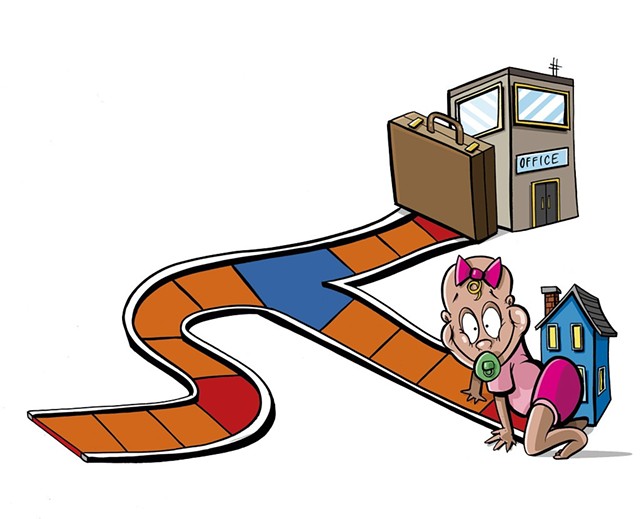Published May 3, 2016 at 6:00 a.m.
We hoped to get people talking with the cover story of our April issue, "Tough Choices: Vermont parents are opting out of work to retain their benefits." Mission accomplished: Dozens of comments started rolling in at kidsvt.com and on social media the day our Money Issue was published.
Writer Katie Titterton definitely struck a chord with readers, many of whom empathized with her decision to quit her full-time job in order to save on childcare costs and qualify for health care subsidies. Many more shared their own experiences navigating the "benefits cliff" — the point at which an increase in income triggers a loss of government-funded benefits, resulting in a net loss to a family's bottom line.
We heard so many stories from families on the edge that we decided to make room for more of them in this issue. Titterton interviewed a few of our online commenters, and we've excerpted those conversations here. You'll also find comments from former legislator Tom Pelham, cofounder of Campaign for Vermont, and former lieutenant governor and Agency of Human Services secretary Doug Racine.
We want policy makers to read these stories as they grapple with changes to health insurance and childcare subsidies. And we want our readers to see these stories and feel less alone. Trust us when we say that there are many more where these came from.
Read Titterton's original report here.
Cathy Resmer, Executive Editor
Not having to worry about health insurance would be worth extra taxes.
We had a baby in November. The plan was for my husband to keep his full-time job and for me to work part time from home. When we did the calculation, it was kinda like, if I work 12 hours a week, we'll be under that cliff; if I work 20, I'll be over. It does not make financial sense for me to work two extra hours a week and then lose $5,000 in health insurance. So we're trying to stay under that, even though there are opportunities for me to work more.
My husband's from Montréal, so we're up there pretty often. We have a couple of friends who've had kids, and, without a thought, they've taken a year off. I think a lot of our friends there would say their health care isn't perfect, but, when it comes down to it, it's just not something they're worrying about.
I feel like there's a perception that Americans wouldn't be willing to pay more taxes. From where I'm sitting, I'd happily pay more taxes. I'd pay $5,000, I'd pay $10,000 to know I had universal health care and it isn't going to sink my family.
Neily Jennings
STARKSBORO
Jennings has a 5-month-old and works as the communications coordinator at Common Ground Center.
Rent and student loans are nonnegotiable bills, so childcare comes out of the grocery budget.
All we're running into is dead end, dead end. Rent goes up every single year; my income's gone down. But we still don't meet [the income threshold to be eligible for state benefits]. Now we're negative $300 a month. So I had to call my parents. They've given us money for food, gas.
I can't defer my college loans forever. I have a car payment so I can work, because my job requires me to have a car, and that money, in theory, could go to childcare. But we have bills. Our bills, like most people's don't just include rent and utilities.
No matter what way we turn, we're faced with sacrificing vital, important things in order to be a functioning family. We can't not have a house. We can't not eat. It's been absolutely horrible.
[Assistance is] based on your income. Nobody really cares how much you spend [on bills and necessities]; all that matters is how much you make. We're in an age where thirtysomething and under are paying off student loans. People aren't getting raises that are matching how much rent is going up.
We are taking people out of the workforce, or putting them in so much that they're not present for their families.
Kate Anger
South Burlington
Anger has a 3-month-old and returned to her full-time job in social services at the end of April.
Wages stay stagnant, and new cliffs keep appearing.
I was a single mom for many years and lived in low-income housing. In that time, I worked more than 30 hours a week, and went to school, and got a degree, and did all the life things you're supposed to do to get ahead. But because we live in a place where wages are so low, I always qualified for benefits. It took me years to climb out of that wage level. As I climbed, I climbed out of certain benefits, like food stamps.
As you move up, you'd think the stress of living paycheck to paycheck would lessen, but what you find with the benefits cliff is, you're moving up but you're not making any progress. Sometimes you're working more hours or you're stressing your life out in more ways to make $200, but that isn't reflected in your [take-home pay].
The interesting thing is, you start hitting the tax-breaks cliff. The tax breaks you qualified for as a lower-income person start disappearing, and when the child turns 16, you lose tax-breaks, as if you weren't still caring for [your child]. My taxes went up. My income didn't go up.
The cost of living in Burlington, and housing is the best representative of this, has increased multifold since I grew up here. And yet we haven't seen a commensurate increase in wages. So that's making all these benefits calculations not really work for here, because those federal benefits are calculated from national norms.
My own personal solution this year, for ecological and financial reasons, was to stop driving my car. For me, it was, This has to be absorbed somehow. What else am I gonna cut out?
Emer Pond Feeney
Burlington
Feeney has an 18-year-old and works full-time as a clerk at the Fletcher Free Library.
Even a good job isn't a buffer when childcare is scarce and expensive.
When the babies were born and I was married, we were a two-income family. We ended up finding out right away that there weren't a lot of [childcare] providers, period. I knew we wouldn't qualify for benefits, so we structured our whole life around putting the twins in care at a local center. We lived as though we were broke. Eked along, knowing they wouldn't always be in childcare, and then we'd have that income back, and then we'd be OK.
Fast-forward to now, and my income is just over the threshold for any subsidy for childcare. What has happened is, we spent every dollar we had in the world — tax returns, work bonus — on childcare, childcare, childcare. In the fall I'm putting them in a center with a preschool because there's that universal pre-K money [Act 166 entitles Vermont children 3 and older to 10 hours per week of free pre-K]. That really makes a difference.
Now the capacity issue comes into play — every other family in the area is trying to find a center that accepts that money.
I have to keep working because I'm [now] a single parent. I don't have the option to look at the economics and stay home. I'm looking for childcare solutions that are almost impossible to find — which will take this pre-K money, and have two spots, in a small community. It's this vice grip, constantly.
Shauna Hill
Montpelier
Hill has 3-year-old twins and works full-time as the assistant director of a youth mental health program.
Pelham: Make the Agency of Human Services more efficient.
KIDS VT: What would you advise a family facing a benefits cliff?
TOM PELHAM: If I were your friend, I would say love your child. Think about that first. The way things are now, you do yourself short-term economic harm by staying in the workforce and not getting the benefits, so it costs your household income by going back to work. That’s a short-term economic loss.
In the long term, I’d say set a goal for yourself to go back to the workforce by x date. If you’re career oriented, then staying out too long gets you out of that flow and might handicap you. That’s a long-term economic loss. I think the world is more forgiving if you stay out for a year, plus or minus.
KVT: What’s the next thing the state can do to address the issue?
TP: I would focus on the [next] governor. If a governor came in and in the inaugural address said to the legislature, “You guys are not going home until we have not only a commitment but a plan in place” that ends the benefits cliff, puts our young people in a place to climb the economic ladder by breaking down silos in AHS [the Agency of Human Services], reinvesting savings in ending the benefits cliff, what happens is taxpayers ultimately benefit because people stay in the workforce and rely on income from the private sector rather than the public sector. The closing of the benefits cliff happens with … making the AHS more efficient. People [currently opting out of the workforce] will benefit, taxpayers will benefit; it’s a win-win, as they like to say.
Lots of resources can be brought to bear to make this an upward slope. Whether its EITC [the Earned Income Tax Credit], or income sensitivity, even healthcare. Why would you want to say to [parents], “We’re going to set up a system that rewards you for being out of the workforce [when you’re earning] in between $9.60 to $20.40 an hour?”
Tom Pelham has served as Commissioner of Housing, Commissioner of Finance and Management, Tax Commissioner and Deputy Secretary of Administration. He is a former state representative and is co-founder of Campaign for Vermont.
Racine: It’s a question of priorities. Prevention is an investment.
KIDS VT: What would you advise a family facing a benefits cliff?
DOUG RACINE: It’s a tough situation… A rational decision is to not get ahead in your job until childcare costs have… gone away because the kids are in school.
… I’d advise them to do the very best they could with their situation and maximize their resources to take care of their families. That might mean not working an extra 5 hours a week.
KVT: What’s the next thing the state can do to address the issue?
DR: The state could add a significant amount of money to the childcare subsidy so people, if they earn a dollar more, aren’t losing two dollars in childcare benefits. They could at least maintain. It would take a lot of money. Three or four years ago, we looked at this. To keep people on an upward trajectory would be $60 million. To keep people maintaining would be $20-30 million. It’s a political decision, it’s a question of priorities... Childcare has not been a priority for many years.
You have to really be willing to disrupt the system to fix it. And that’s hard to do. Systems are really strong. …It takes an investment that doesn’t pay off for several years.
…If we put $5 million in a program this year, but then it [starts to] save us $5 million a few years later, we still have to come up with that first $5 million. That’s why we tend to do crisis management for families instead of prevention.
Doug Racine has served as a state senator, Lieutenant Governor and as Secretary of the Agency of Human Services.
Stories compiled and condensed by Katie Titterton.
This article was originally published in Seven Days' monthly parenting magazine, Kids VT.
Speaking of...
-

Can You Dig It? Make Your Own Worm Farm With These Simple Steps
Aug 24, 2021 -

Mr. Fix-It: Marty Spaulding Works Behind the Scenes to Help Students Learn on Campus
Aug 24, 2021 -

Back to School During Delta: A Pediatrician With Young Children Offers a Road Map — and Survival Strategies
Aug 24, 2021 -

How to Savor Vermont's Shortest, Sweetest Season
Jun 29, 2021 -

Good Citizens Rocked the At-Home Challenge
Apr 6, 2021 - More »
Comments
Showing 1-1 of 1
Comments are closed.
From 2014-2020, Seven Days allowed readers to comment on all stories posted on our website. While we've appreciated the suggestions and insights, right now Seven Days is prioritizing our core mission — producing high-quality, responsible local journalism — over moderating online debates between readers.
To criticize, correct or praise our reporting, please send us a letter to the editor or send us a tip. We’ll check it out and report the results.
Online comments may return when we have better tech tools for managing them. Thanks for reading.




















































